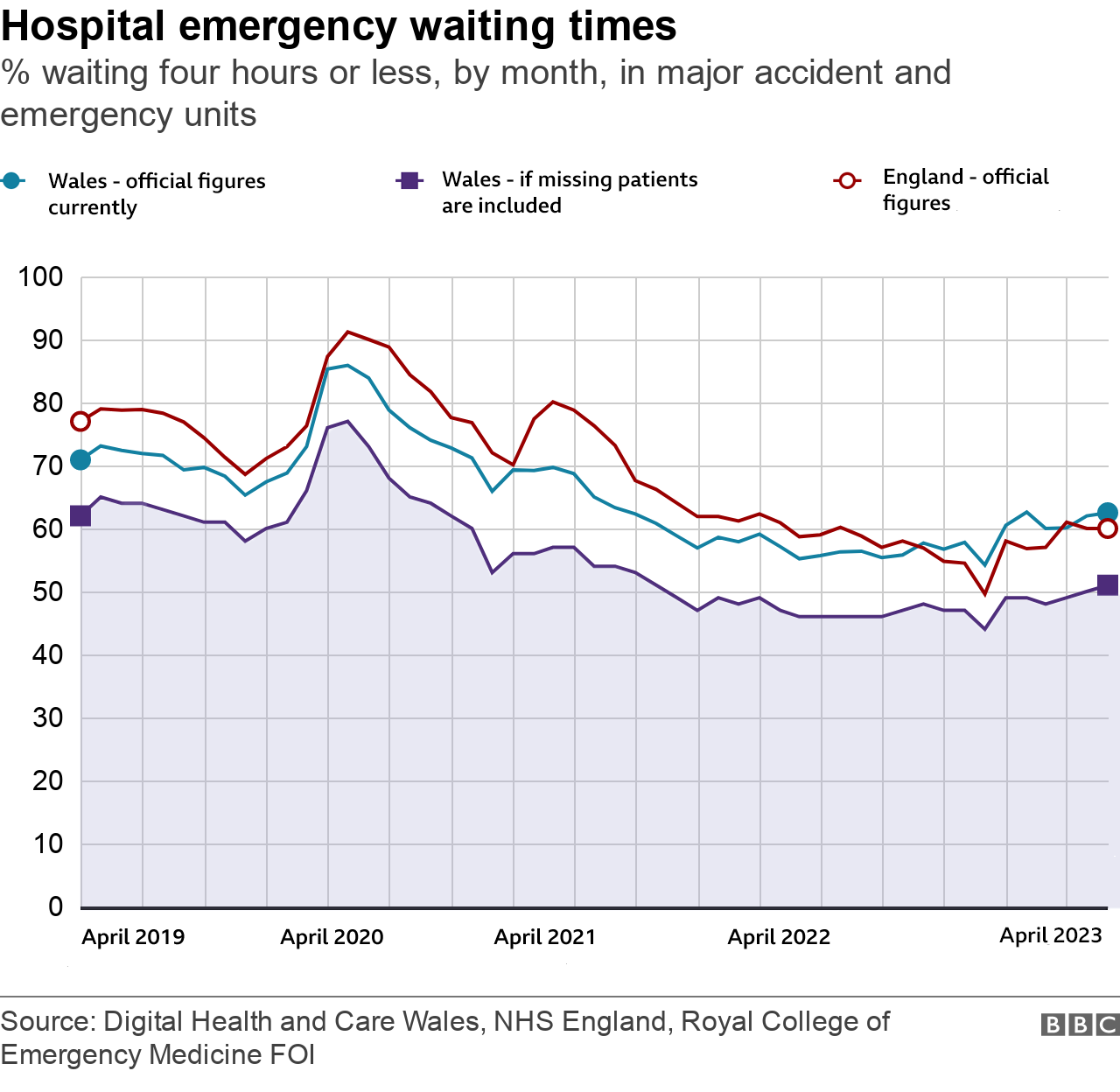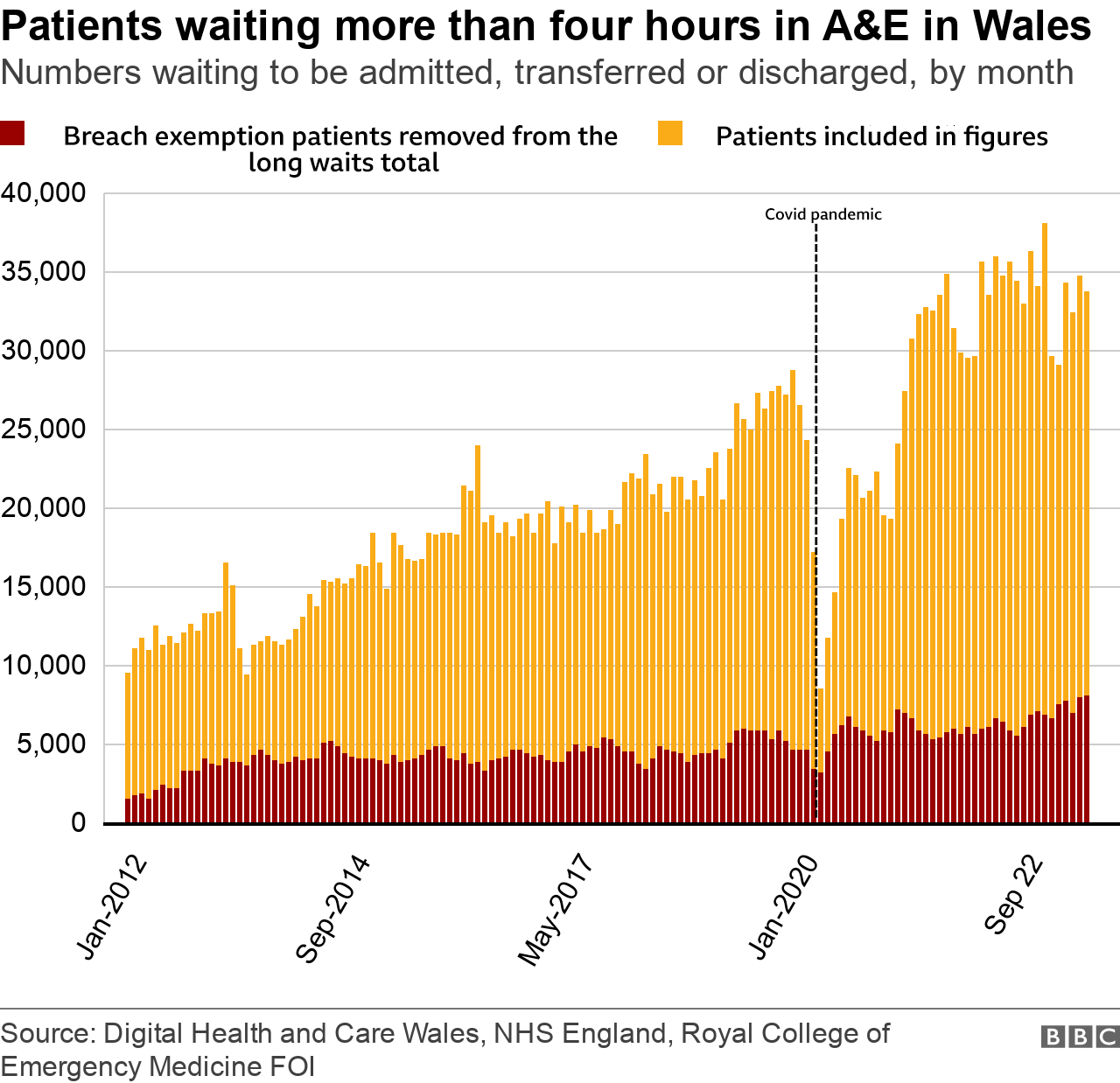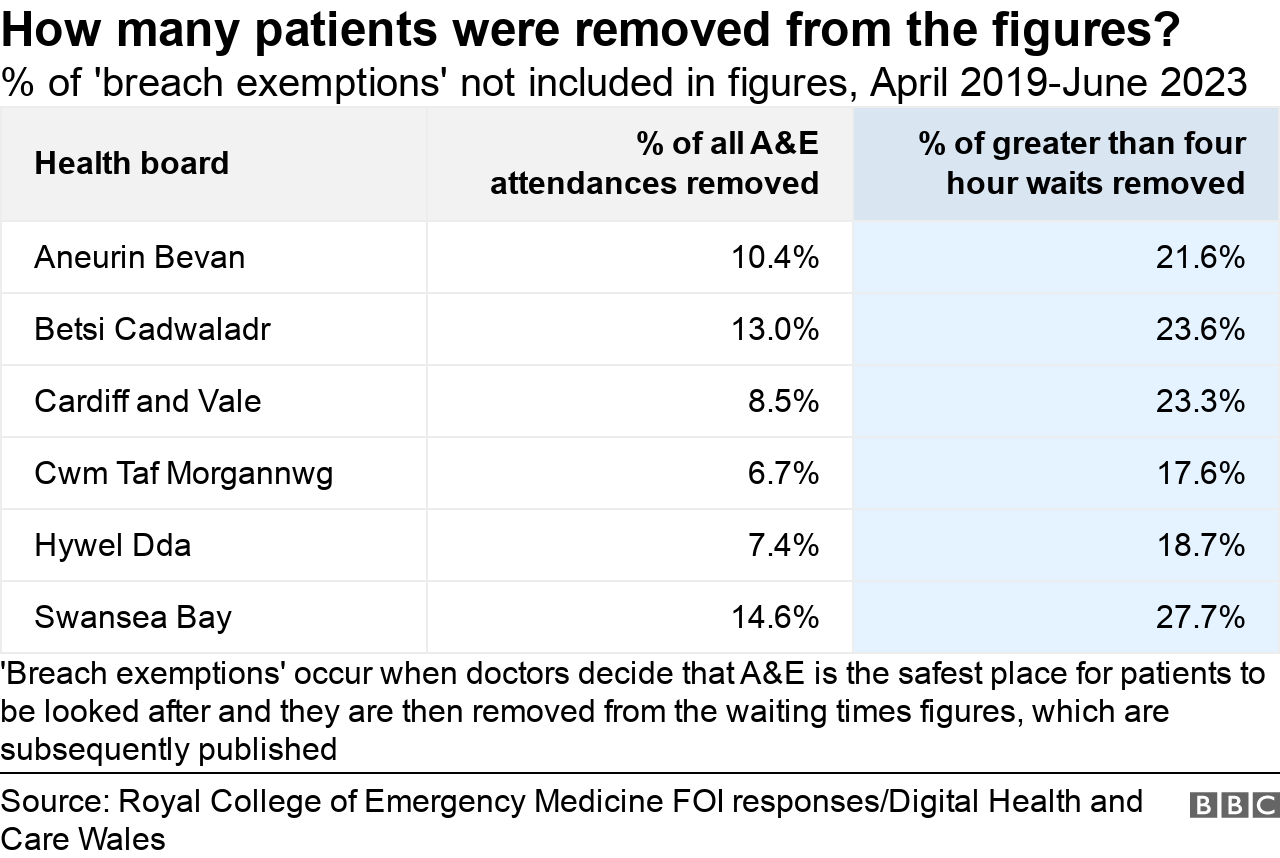NHS Wales: Thousands of hours missing from A&E figures - doctors
- Published

The Royal College of Emergency Medicine says the waits of thousands of patients each month are not counted
The true picture of A&E waiting times in Wales has been seriously under-reported for a decade, senior doctors have told the BBC.
The Royal College of Emergency Medicine (RCEM) claims it has established thousands of hours are missed from monthly figures.
Senior A&E doctors have been raising the issue for months.
The Welsh government has refuted the claims and has questioned the interpretation of the figures.
The RCEM said it could not measure "how bad" things were because thousands of patients subject to so-called "breach exemptions" were not included in the number of long waits in A&E.
Wales' health minister has repeatedly claimed A&E waiting times in Wales have "bettered English performance".
But once the missing data is taken into account, it suggests the performance in Wales is worse.
What is a 'breach exemption?'
Doctors don't normally want to keep patients in emergency departments any longer than necessary, but they are able to in certain circumstances.
These are called "breach exemptions" - as they breach the four, eight and 12-hour waiting targets for A&E.
Exemptions may follow when:
Patients who are clinically unstable need more input from the emergency team
Test results are needed before they can be admitted or discharged
Patients need plaster-casts on broken bones
Input is needed by occupational therapy or physiotherapy
The patient is unlikely to know if they fall into this category and they might not notice the difference in the care they receive.
But the RCEM said any time spent in A&E from that point on does not count towards the official monthly statistics on how long they wait.
It said Wales was the only UK nation to do it this way.
Doctors warn it could mask underlying issues and not give the full picture of the pressure A&Es are under.
What is the Royal College's argument?
"We are not getting a true reflection of what is exactly happening on the shop floor," said Dr Suresh Pillai, vice president of RCEM for Wales.
"This year alone from January to June, they have excluded about 45,000 patients and that's a huge number.
"If you don't factor those patients in the already overcrowded emergency department, we cannot measure how bad things are.
"If you don't get the true figures, then the perception would be 'everything is fine'. In fact, it is not."
Dr Pillai said the issue had routinely been raised during meetings with the health minister and officials.

FOI responses to the RCEM show that in the first six months of this year, 38.7% of patients in Wales waited longer than four hours in A&E departments.
When breach exemptions were included, as they were in other parts of the UK, the figure was 50%.
That's more than 45,000 long waits - or 12% - removed from the figures.
From January 2012 to June this year, more than 670,000 patients were not included in published figures - 23% of the total.

"I'm really concerned about the winter and that is purely because the figure that is published is misleading," said Dr Pillai.
"We always try to make plans for the winter but if we have already excluded 12% of patients in the first six months are we really factoring that to our winter plans?"
The RCEM has been campaigning for transparent data to drive up the quality and safety of care, as long waits in A&E are directly related to worse patient outcomes.
It raised the issue as long ago as 2021, in a submission to the Senedd's health and social care committee., external

How does Wales compare with England?
Waits for planned care in Wales have compared poorly with England, but published data has so far given the impression Wales is doing far better at reducing A&E waits compared to England.
The health minister has previously said waiting times at major emergency departments in Wales have "bettered English performance".
But when data from the RCEM is included, it suggests the performance in Wales is worse.

Dr Suresh Pillai, vice president of RCEM for Wales has been raising the issue for months
The RCEM is calling on Welsh government to publish all of the figures.
When first contacted for a response by BBC Wales, the Welsh government claimed breach exemptions were included but "handled differently" and that they were broadly equivalent to practice in England.
But it later said: "Breach exemptions [or clinical exceptions] should be included in our published emergency department statistics.
"Sometimes patients in emergency departments need an extended period of observation or treatment before it is safe to leave. Guidance has been in place since 2011 to help staff avoid inappropriately admitting or discharging these patients, in an attempt to 'hit the target'.
"We have asked health boards for assurances they are following the guidance, to ensure the data is absolutely transparent."
Later, the Welsh government went on to refute the claims and again questioned the interpretation of the figures.
A spokesperson said: "Welsh health boards have confirmed that breach exceptions are included in the monthly data, in line with the guidance issued in 2011.
"We have seen no evidence to support the suggestion by the RCEM and the BBC that there has been any under-reporting or that our data is not comparable with the other parts of the UK."
What does this mean for the Welsh government?
The body representing senior A&E doctors and the Welsh government are now at loggerheads over this, after days behind the scenes to-ing and fro-ing over the detail.
Both insist they are in the right.
There is disagreement about how the freedom of information data, which came back from the health boards, has been interpreted, although the RCEM is very clear about the detail in the questions it had asked and the responses it got back.
The Welsh government though is adamant it has not under-reported the figures.
What has been the response?
Welsh Secretary David TC Davies said it was "embarrassing and scandalous" that thousands of A&E waits in Wales had not been counted for a decade.
"Time and time again, the Labour-run Welsh government has badly let down our NHS in Wales. Getting a grip of this very serious situation must be Labour's priority, rather than wasting time on creating more Members of the Senedd and other needless projects," he said.
"Solving this latest scandal is a priority for the people of Wales - and I call on Labour to, at long last, listen to them."
Plaid Cymru's health spokesman Mabon ap Gwynfor called it a "fiasco".
"This is not just about patients waiting longer than necessary - which is bad enough - but about the consequences of under reporting in terms of workforce planning and health board budgeting," he said.
"Welsh government is quick to point the finger of blame at health boards, yet we understand the data is collected according to government guidance. What's more, senior A&E doctors have been raising the concern for months - only to be dismissed by government."
This story was updated on October 25 to make it clear that Welsh waiting times figures remove breach exceptions from the number of long waits and not from the data entirely.

Are you experiencing a long wait for an NHS procedure? Have you funded an operation privately because of long NHS waits? You can share your experiences by emailing haveyoursay@bbc.co.uk, external.
Please include a contact number if you are willing to speak to a BBC journalist. You can also get in touch in the following ways:
WhatsApp: +44 7756 165803
Tweet: @BBC_HaveYourSay, external
Please read our terms & conditions and privacy policy
If you are reading this page and can't see the form you will need to visit the mobile version of the BBC website to submit your question or comment or you can email us at HaveYourSay@bbc.co.uk, external. Please include your name, age and location with any submission.
Related topics
- Published15 August 2023

- Published21 September 2023

- Published20 July 2023
